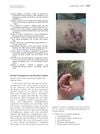 May 2015 in “Journal of The American Academy of Dermatology”
May 2015 in “Journal of The American Academy of Dermatology” Mycophenolate mofetil may improve symptoms and stop hair loss in Lichen planopilaris, but more research is needed.
 November 2014 in “Prescriber”
November 2014 in “Prescriber” The 16-year-old girl with hair loss was successfully treated for alopecia areata, leading to significant hair regrowth.
 April 2012 in “Informa Healthcare eBooks”
April 2012 in “Informa Healthcare eBooks” Alopecia areata is a common autoimmune condition causing varying hair loss, diagnosed by specific patterns of inflammation around hair follicles, with several treatment options available.
[object Object] 
A 72-year-old man was diagnosed with a rare skin form of Rosai-Dorfman disease after years of misdiagnosis.
 May 2021 in “Our Dermatology Online”
May 2021 in “Our Dermatology Online” A woman with a rare scalp condition causing a thick scalp and hair loss didn't improve with steroid treatment.
 August 2015 in “Dermatología Argentina”
August 2015 in “Dermatología Argentina” Frontal fibrosing alopecia causes hairline recession and eyebrow loss in postmenopausal women.
 May 2010 in “Journal of the Dermatology Nurses' Association”
May 2010 in “Journal of the Dermatology Nurses' Association” Cicatricial alopecia causes permanent hair loss and is treated to relieve symptoms and stop progression.
June 2020 in “Journal of Drugs in Dermatology” Frontal fibrosing alopecia can be misdiagnosed as androgenetic alopecia in African American women.
[object Object] November 2022 in “Frontiers in Medicine” PRP shows promise for treating mild alopecia areata but needs more research for cicatricial alopecias.
 July 2010 in “British Journal of Dermatology”
July 2010 in “British Journal of Dermatology” Hair loss in women may have multiple causes, and eyebrow regrowth possible with specific injections.
 182 citations,
December 2017 in “Journal of the American Academy of Dermatology”
182 citations,
December 2017 in “Journal of the American Academy of Dermatology” Some treatments can help with a hair loss condition called alopecia areata, but none ensure lasting results; choices depend on the person, with JAK inhibitors showing promise for severe cases.
 102 citations,
April 2014 in “International Journal of Dermatology”
102 citations,
April 2014 in “International Journal of Dermatology” The treatment helped reduce symptoms and stabilize the hairline in most patients with Frontal Fibrosing Alopecia, but hair regrowth was limited.
7 citations,
January 2012 in “International Journal of Trichology” Sudden, unusual hair loss may indicate serious underlying health issues.
 November 2023 in “Aktualʹnì problemi sučasnoï medicini”
November 2023 in “Aktualʹnì problemi sučasnoï medicini” The guidelines suggest using various treatments, including antidepressants and steroids, for alopecia areata and discuss the condition's genetic and immune aspects.
 January 2022 in “Clinical dermatology open access journal”
January 2022 in “Clinical dermatology open access journal” Early-stage Alopecia Areata was effectively treated in less than six months.
 October 2017 in “Journal of Investigative Dermatology Symposium Proceedings”
October 2017 in “Journal of Investigative Dermatology Symposium Proceedings” Using lidocaine before keloid injections makes the treatment more comfortable for patients.
 May 2007 in “Dermatologic Therapy”
May 2007 in “Dermatologic Therapy” Hair care practices like using relaxers and tight braiding can lead to permanent hair loss in black women.
43 citations,
January 2015 in “Journal of Cutaneous Medicine and Surgery” Most patients improved with oral antibiotics, but some needed long-term treatment or had minimal response.
2 citations,
March 2005 in “Journal of the American Academy of Dermatology” Hair transplants with cortisone can help treat stubborn eyebrow hair loss.

The combination therapy effectively improved acne keloidalis nuchae.
 46 citations,
November 1995 in “The Journal of Dermatology”
46 citations,
November 1995 in “The Journal of Dermatology” Alopecia areata was most common in people in their 30s and 40s, with some family history and a higher relapse rate, and larger bald areas responded better to specific immunotherapy.
 25 citations,
July 1994 in “Archives of Dermatology”
25 citations,
July 1994 in “Archives of Dermatology” A man's skin condition, pemphigus vulgaris, came back after he was treated with interleukin 2 for cancer.
 11 citations,
November 2019 in “Clinical Case Reports”
11 citations,
November 2019 in “Clinical Case Reports” A Brazilian teenager with severe hair loss had total hair regrowth with no side effects after using tofacitinib.
5 citations,
August 1981 in “Archives of Dermatology” Alopecia areata may be caused by the immune system attacking hair follicles.
 4 citations,
July 2020 in “Journal of Dermatological Treatment”
4 citations,
July 2020 in “Journal of Dermatological Treatment” Minoxidil injections can speed up hair regrowth in non-severe patchy hair loss, but combining it with steroids doesn't improve results.
 3 citations,
May 2022 in “JAAD case reports”
3 citations,
May 2022 in “JAAD case reports” A woman developed alopecia after her second Pfizer vaccine but regrew her hair with treatment and had no issues after a booster shot.
 1 citations,
January 2023 in “Przegląd Dermatologiczny”
1 citations,
January 2023 in “Przegląd Dermatologiczny” The Polish Society of Dermatology recommends treatments for alopecia areata that vary by severity, including topical and systemic medications, with long-term maintenance important for management.
 September 2022 in “JAAD Case Reports”
September 2022 in “JAAD Case Reports” COVID-19 may worsen hair loss in people with a certain type of scarring alopecia, but early treatment can help improve symptoms and hair regrowth.
7 citations,
November 2021 in “JAAD Case Reports” Mogamulizumab can cause hair loss and skin rashes.
 2 citations,
January 2022 in “Skin appendage disorders”
2 citations,
January 2022 in “Skin appendage disorders” A combination of methotrexate injections and CO2 laser treatment led to complete hair regrowth in two patients with hard-to-treat alopecia.























